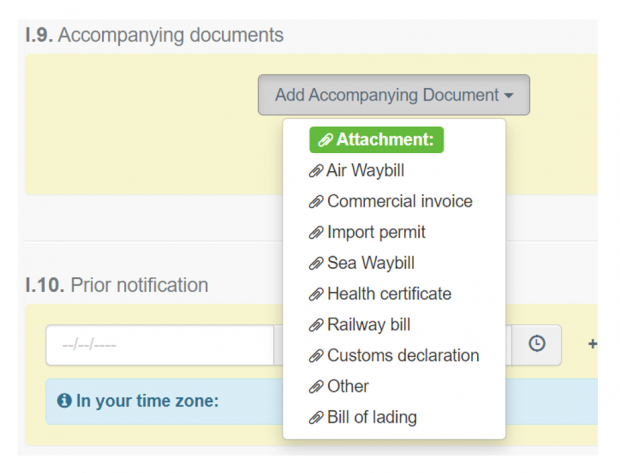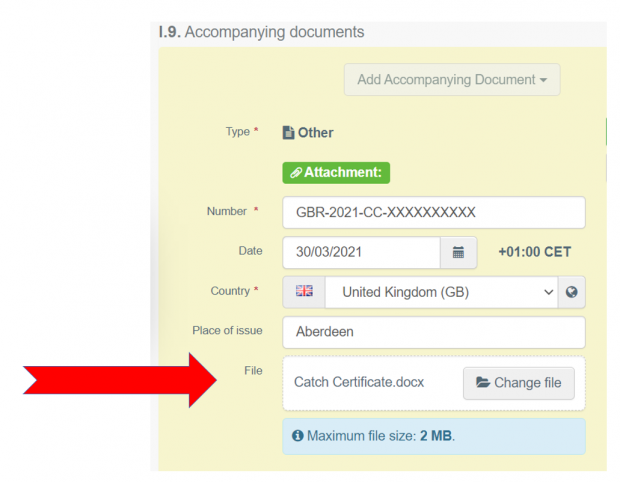What is a Catch Certificate?
A catch certificate is required as a key part of Regulation (EU) 1005/2008 which aims to prevent, deter and eliminate Illegal, Unreported and Unregulated fishing activity, with the objective of guaranteeing the legal origin of fisheries products entering the entering the EU Sanitary and Phytosanitary (SPS) regulatory zone from third countries, including GB.
A catch certificate provides information, which proves that the fishery product/s have been caught under a legal fishing regime.
A catch certificate includes (but is not limited to) the following information:
- that the boat is licensed by the fishing authority
- that the boat has permission to catch the species that has been caught when and where the fish was caught
- the species and commodity code, also known as product code
- that the amount of fish being exported is not more than the original landed weight
- information on the transportation journey
Importing fishery products into Northern Ireland
As a Northern Ireland importer of fishery products, that originated from outside of NI and the EU, you must obtain a copy of a validated catch certificate, issued by the government that manages the fishing vessel/s, from the exporter.
You must then upload that catch certificate before the arrival of the fishery products to a Northern Ireland Sanitary and Phytosanitary (SPS) Inspection Facility. You can attach your catch certificate to your CHED P, which is required to move fish and fishery products into NI. You may wish to use DAERA’s Guidance notes on how to create a CHED-P. Contact details for NI Sanitary and Phytosanitary Inspection Facilities can be found at Which NI authorities have roles and responsibilities for Fish and Fishery Products in Northern Ireland?.
Which NI authorities are responsible for ensuring catch certificate requirements are met and what are their roles?
highlights DAERA’s responsibilities, as the Central Competent Authority (CCA), with regard to the prevention, deterrence and elimination of Illegal, Unreported and Unregulated (IUU) fishing activity in line with Regulation (EU) 1005/2008. This is achieved through monitoring and inspection of IUU catch certificates, at the NI SPS Inspection Facility. Under the provisions of The Sea Fishing (Illegal, Unreported and Unregulated Fishing) Order (Northern Ireland) 2018 local authorities have also been designated as the relevant competent authority for checks on IUU Catch Certificates. As such, local authorities authorise their own officers to perform checks on fishery products, including IUU Catch Certificates.
Further information on which NI authorities have roles and responsibilities for fish and fishery products can be found Which NI authorities have roles and responsibilities for Fish and Fishery Products in Northern Ireland?.
Are there any catch certificate requirements for m atoving fish and fishery products for human consumption from GB into Northern Ireland?
A catch certificate and other IUU documentation may be required to accompany fish intended for human consumption, where:
- you directly move fish from GB to NI
- fish landed in GB ports (including Isle of Man) by NI flagged vessels is subsequently moved to NI
- fish sourced from GB flagged vessels landed in GB ports is subsequently moved by you as the trader to NI
- you move fish products to GB and some form of processing/storage is completed in GB before onward movement to NI (you may have to provide details to complete the relevant catch certificate information for the GB trader)
This trade will need to enter via a NI SPS Inspection Facility and also be accompanied by the following information:
You may also be required to submit the following documentation depending on the particular scenario/journey:
Further information can be found on the FSA website here
FSA contact details: Executive.Support@food.gov.uk 028 90417700
Are there any catch certificate requirements for composite products containing fish?
Some composite products that contain wild caught fish may also be required to obtain the appropriate Illegal, Unreported and Unregulated (IUU) catch certificates. The relevant CN codes are those that fall under Chapter 3 and the Tariff headings 1604 and 1605.
If the product contains wild caught fish making up more than 20% by weight of its total ingredients, you will need to obtain the appropriate catch certificate.
Farmed aquaculture does not require a catch certificate, even if it falls under the same Tariff Headings highlighted above. Furthermore, other products containing or obtained from fishery products, not classified in Chapter 3 or in Tariff headings 1604 and 1605, are also excluded for example, products classified in Chapter 15 (fish fats and oil etc).
Are there any instances where I won’t need a catch certificate for certain products?
You do not need a catch certificate if you are moving any of the following:
- Pet food
- Animal feed
- Fish by-products such as fish oil
- farmed fish and farmed shellfish
- freshwater fish or freshwater shellfish
- fish fry or larvae
- some molluscs (including mussels, cockles, oysters, and scallops)
A detailed list of excluded fishery products can be found in Annex I of the IUU Regulation EC 1005/2008
Do I need a catch certificate, storage document or processing statement if I am moving scallops, including queen scallops and farmed aquaculture?
You do not need these if you are moving any of the following:
- farmed fish and farmed shellfish
- freshwater fish or freshwater shellfish
- fish fry or larvae
- some molluscs (including mussels, cockles, oysters, and scallops)
See the full list of products excluded from the definition of 'fishery products'.
What do I need to do if I am landing exempt fisheries products?
Please visit our Direct landings webpage for more information.
I store unprocessed fish that originated from outside of the UK on premises in GB before moving to NI, do I need a storage document?
Yes. If you’re moving fish from GB to NI, for any fish sourced from another country that has been stored in GB for 24 hours or longer, but not processed in any way, you’ll need to create a storage document.
*You must keep a copy of the catch certificate from the original consignment with the storage document.
An instructional video on creating a storage document can be found at How to create a UK storage document | YouTube.
I move fish, that originated from outside of the UK, into NI that has been processed in GB – do I require a processing statement?
Yes. If you’re moving fish from GB to NI, for any fish sourced from another country that has been processed in GB, you’ll need to create a processing statement.
An instructional video on creating a processing statement can be found at How to create a Processing Statement | YouTube.
*You must keep a copy of the catch certificate from the original consignment with the Processing Statement.
How do I create an export catch certificate?
To complete a catch certificate on the Fish Export Service (FES) please go to Create a UK catch certificate | gov.uk.
You will need:
- a Government Gateway user ID and password (you can create these HMRC online services: sign in or set up an account | gov.uk)
- the company name and address of the exporter
- the name of the person responsible for the export
- the species (or Food and Agriculture Organisation (FAO) code or commodity code)
- it’s state and it’s presentation
- the names or Port Letters and Numbers (PLNs) of the vessels that caught the species
- the landing dates for each species
- the export weights of each product
- to specify whose waters the species were caught in - the FAO area
- transport details for how the export will leave the UK and where it will leave from
- the identification numbers of the containers used to export the product (if applicable)
- You will then get a PDF which will need to be sent to the importer in Northern Ireland.
- This will be uploaded in TRACES along with your other import documentation
An instructional video on how to create a UK catch certificate can be found at How to create a UK catch certificate | YouTube.
What do I do with the export catch certificate as an importer?
Currently, if you are importing wild caught fishery products to Northern Ireland, you need to upload the catch certificate information supplied by the exporter, directly into TRACES NT, along with the Export Health Certificate (EHC) and all supporting documentation.
Please note: If you are exporting fishery products from GB to Northern Ireland you will need to register on TRACES NT using a Northern Ireland or EU Member State address, otherwise you will be unable to complete the process.
Currently Port Health Authorities (PHAs) are asking importers to utilise the CHED-P pre-notification process to pre-notify catch certificates.
There are two elements to the inspection:
- Pre-notification - 100%
- Documentary check – 100%
- For fish and fishery products for human consumption pre-notification is done by completion and submission of Part I of the CHED-P on TRACES NT.
- Please attach the catch certificate to the CHED-P in box 1.9 selecting “other” from the dropdown menu. By doing this you are linking the catch certificate to the consignment.
Pre-Notification Box 1.9 (dropdown)


- Section 11 of the ‘Importer Declaration’ MUST be completed by the Northern Ireland/EU importer, who is responsible for importing compliant fish and fishery products.

Please note: The catch certificate must only be completed in respect of the part of the catch that is being moved to Northern Ireland/EU.
Who is responsible for Sanitary and Phytosanitary checks on fishery products?
The Food Standards Agency NI is the Central Competent Authority for food safety, including imported food, and has specific policy responsibility for fish and fishery products for human consumption.
Further information can be found on the FSA website.
FSA contact details: Executive.Support@food.gov.uk 028 90417700
Information on which NI authorities have roles and responsibilities for fish and fishery products can be found at Which NI authorities have roles and responsibilities for Fish and Fishery Products in Northern Ireland?.
Grace period for authorised traders moving food from GB to NI
There is a grace period from certification from 1 January 2021 through to 1 October 2021 for authorised traders such as supermarkets and their trusted suppliers.
For those traders who are authorised, DAERA has detailed Guidance at Detailed Guidance for Authorised Traders.
Other useful links:
- Create a catch certificate
- Create a storage document
- Create a UK processing statement
- DAERA guidance for the collection and movement of SPS goods from GB to NI through Groupage
- DAERA guidance on changes to the rules for movement of composite products from GB to NI/EU from 21 April 2021
- Changes to the rules for movement of composite products from GB to NI/EU from 21 April 2021
- DAERA Detailed Guidance for Authorised Traders
- Exporting fish from GB to the EU or moving it to NI
- Exporting or moving fish from the UK
- Food labelling: giving food information to consumers
- Get an Export Health Certificate (EHC)
- Traceability and Labelling Information
Further information on importing products to Northern Ireland, may also be obtained on the Food Standards Agency website.
You may also wish to visit our DAERA Fisheries webpage, which continue to be updated on a regular basis.
